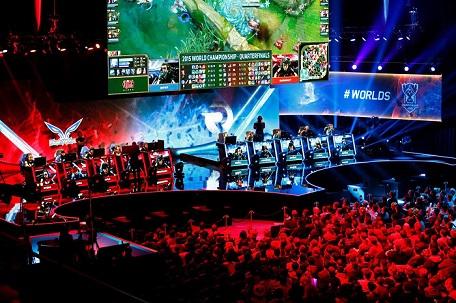Market Overview:
The eSports market share encompasses competitive video gaming, where professional players compete in organized tournaments and leagues across various gaming genres such as MOBAs (Multiplayer Online Battle Arenas), first-person shooters, and real-time strategy games. These events are often streamed live to a global audience, attracting millions of viewers and generating substantial revenue through sponsorships, advertising, and media rights. With the rise of platforms like Twitch and YouTube Gaming, eSports has become more accessible, further fueling its popularity.
Competitive Analysis:
The eSports landscape is highly competitive, with major players such as Tencent, Activision Blizzard, and Electronic Arts dominating the industry. These companies have strategically invested in eSports leagues, teams, and events, leveraging their intellectual properties to create engaging and immersive gaming experiences. Additionally, new entrants and independent organizers have contributed to the diversity and vibrancy of the eSports ecosystem, fostering innovation and pushing the boundaries of competitive gaming.
Market Drivers:
Several key drivers have propelled the expansion of the eSports market. The proliferation of high-speed internet and the widespread adoption of mobile devices have empowered a global audience to engage with eSports content seamlessly. Furthermore, the growing acceptance of eSports as a legitimate form of entertainment has attracted significant investment from traditional sports organizations, tech companies, and venture capitalists. The rise of esports betting and the integration of virtual reality and augmented reality technologies have also contributed to the market's upward trajectory.
Get PDF Sample Report + All Related Table and Graphs:
https://www.marketresearchfuture.com/sample_request/11277
Market Restraints:
https://www.marketresearchfuture.com/sample_request/11277
Market Restraints:
Despite its rapid growth, the eSports market faces certain restraints that warrant attention. One of the primary challenges is the need for standardized regulations and governance to ensure fair play, player welfare, and integrity within the industry. Additionally, concerns regarding excessive screen time and potential health implications for players, particularly in the context of young audiences, have led to discussions around responsible gaming practices and the need for comprehensive player support systems.
Segment Analysis:
Segment Analysis:
The eSports market can be segmented into various categories, including game genre, revenue streams, and audience demographics. Different gaming genres like MOBAs, first-person shooters, and sports simulations appeal to distinct fan bases, each with its unique characteristics and preferences. Revenue streams encompass sponsorships, media rights, advertising, merchandise, and ticket sales, each contributing to the overall monetization of eSports events. Understanding these segments is crucial for stakeholders to tailor their strategies effectively and capitalize on market opportunities.
Regional Analysis:
Regional Analysis:
The eSports market exhibits significant regional variations in terms of audience engagement, infrastructure, and regulatory frameworks. Asia-Pacific stands out as a powerhouse for eSports, with a large and passionate fan base, robust gaming infrastructure, and a thriving ecosystem of professional leagues and tournaments. North America and Europe also boast mature eSports markets, characterized by strong consumer spending, innovative content creation, and strategic partnerships with traditional sports organizations. Emerging regions like Latin America and the Middle East present untapped potential, offering new growth avenues for market expansion.
The eSports market represents a dynamic and rapidly evolving industry with immense potential for growth and innovation. While it is essential to acknowledge the market's challenges, such as regulatory concerns and player welfare, the overall trajectory of eSports is undeniably positive. Understanding the market drivers, competitive landscape, and regional dynamics is crucial for stakeholders seeking to capitalize on this burgeoning sector. As eSports continues to captivate audiences worldwide, it is poised to redefine the entertainment landscape and create new opportunities for industry participants and fans alike.
The eSports market represents a dynamic and rapidly evolving industry with immense potential for growth and innovation. While it is essential to acknowledge the market's challenges, such as regulatory concerns and player welfare, the overall trajectory of eSports is undeniably positive. Understanding the market drivers, competitive landscape, and regional dynamics is crucial for stakeholders seeking to capitalize on this burgeoning sector. As eSports continues to captivate audiences worldwide, it is poised to redefine the entertainment landscape and create new opportunities for industry participants and fans alike.
